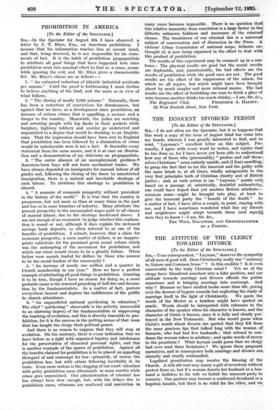PROHIBITION IN AMERICA
[To the Editor of the SPECTATOR.] SIR,—In the Spectator for August 8th I have observed a letter by J. T. Rhys, Esq., on American prohibition. I assume that his information reaches him at second hand, and that, being deceived, he is not responsible for his state- ments of fact. It is the habit of prohibition propagandists to attribute all good things that have happened here since prohibition went into nominal effect to that as a cause, mean- while ignoring the evil, and Mr. Rhys gives a characteristic list. Mr. Rhys's claims are as follows :—
1. " An estimated reduction of 250,000 industrial accidents per annum." Until the proof is forthcoming I must decline to believe anything of the kind, and the more so in view of what follows.
2. " The closing of nearly 2,000 prisons." Naturally, there has been a reduction of convictions for drunkenness, but against that we have, as a development since prohibition, an increase of serious crimes that is appalling, a menace and a . danger to the country. Meanwhile, the police are watching and arresting people with hip flasks in their pockets while burglary, highway robbery and murder go undetected and unpunished to a degree that would be shocking to an English- man. That the impression should have been sent to England that prohibition has been followed by a diminution of crime would be unbelievable were it not a fact. It discredits every statement from the same source, and it is at once an illustra- tion and a demonstration of my strictures on propagandists.
3. " The entire absence of an unemployment problem.'& American-born boys will not learn mechanical trades. We have always depended on immigrants for manual labour of all grades and, following the closing of the doors to unrestricted immigration, there is a natural and inevitable shortage of such labour. To attribute this shortage to prohibition is absurd.
4. " A measure of economic prosperity without precedent in the history of the world." It is true that the country is prosperous, but not more so than at many times in the past and less so in some branches of industry. Many attribute the present prosperity to the unexampled wages paid to all classes of manual labour, due to the shortage mentioned above. I am not enough of an economist to judge whether this explana- tion is sound or not, although it does explain the increased savings bank deposits, so often referred to as one of the benefits of prohibition. I submit, however, that a claim for economic prosperity, a mere matter of dollars, is an inappro- priate substitute for the promised great. moral reform which was the mainspring of the movement for prohibition, and which our crime record shows to be a ghastly failure. When before were morals traded for dollars by those who assume to be the moral leaders of the community ?
5. " An increase of nearly one million and a quarter in Church membership in one year." Here we have a perfect example of attributing all good things to prohibition. Granting it to be true, though I have no reason for doing so, a more probable cause is the renewed preaching of hell-fire and damna- tion by the fundamentalists. As a matter of fact, pastors everywhere lament and deplore the indifference of the public to church attendance.
6. " An unparalleled national quickening in education." The chief " quickening " observable is the activity (successful to an alarming degree) of the fundamentalists in suppressing the teaching of evolution, and this is directly traceable to pro- hibition, for it is the success in the putting across of that issue that has taught the clergy their political power.
And there is no reason to suppose that they will stop at evolution. On the contrary, there is every indication that we have before us a fight with organized bigotry and intolerance for the preservation of elemental personal rights, and this is another example of the spawn of prohibition. Against all the benefits claimed for prohibition is to be placed an appalling disregard of and contempt for law—primarily, of course, the prohibition law, but with others following inevitably in its train. Even more serious is the clogging of our court calendars with petty prohibition cases (thousands in some courts) while crime goes unpunished. Our administration of criminal law has always been slow enough, but, with the delays due to prohibition cases, witnesses are scattered and conviction in many cases becomes impossible. There is no question that( this relative immunity from conviction is a large factor in the hitherto unknown boldness and assurance of the crimina classes. The breakdown of our criminal law is a universal/ subject of conversation and of discussion in the Press. A citizens' Crime Commission of national scope, hitherto unl thought of, is now being organized in the effort to deal with!
this product of prohibition. The results of this experiment may be summed up in a send tence : The physical results are good but the moral results are deplorable, and, paradoxically, the bad effects are the results of prohibition while the good ones are not. The good results are the effect of the suppression of the saloon, for which we all rejoice, but which might have been brought about by much simpler and more rational means. The bad results are the effect of forbidding one man to drink a glass of wine because another drinks too much whisky.—I am, Sir, &c.,










































 Previous page
Previous page